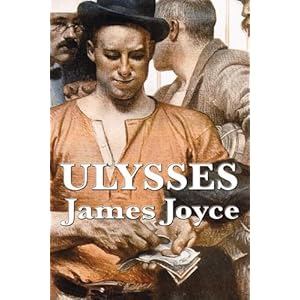 At the moment you can hardly turn on Radio 4 without hearing a mention of James Joyce. We keep hearing about what a great writer he was. I'm sorry, but I just can't agree.
At the moment you can hardly turn on Radio 4 without hearing a mention of James Joyce. We keep hearing about what a great writer he was. I'm sorry, but I just can't agree.Probably 99 percent of the population has never read any Joyce. And the majority of those who have attempted to read Ulysses (say) have given up because it is practically unreadable. Yes, I admit, Joyce has a small but very vocal cadre of fans, but I'd suggest the majority who nod to the genius of Joyce do so because of his repute rather than out of personal enjoyment of his work.
I would like to be a trifle iconoclastic here and suggest Joyce is not a great writer at all. Being a great writer is about being a great communicator. Joyce is a rubbish communicator. I'd also like to suggest that you can't be a truly great writer unless your works appeal to the public at large. This doesn't mean you have to be writing populist tripe. You can be covering deep and troubling issues - but if you are a great writer you should be capable of making those issues approachable and comprehensible. Otherwise you are someone with great ideas (possibly) who can't write for toffee.
Now, whenever people take the line I am taking they get accused of trying to drag things down to a lowest common denominator. Clearly I am saying that Dan Brown and Geoffrey Archer are great writers because their books are very popular. Not at all. That is totally and deliberately missing the point. Just because I'm saying a great writer should be approachable and popular doesn't mean that all popular writing is great. That would be like saying because beer is bitter, everything bitter is beer.
The fact is that Shakespeare, Austen and Dickens (to name but three minor talents) were all very popular and populist as well as being great writers. Some may struggle with Shakespeare today because the language is unfamiliar, but there is no doubt he wasn't writing to be appreciated by a few obscurantists. And that his work still has a very broad appeal if it is presented correctly.
So I am quite happy for James Joyce fans to go on their pilgrimages to Ireland and be thrilled by little quotes and events and twee names for days. But don't impose it on the rest of us.

HA. Sorry, but after all these years we now have something to disagree on :-) I won't bore you with a pro-Joycean diatribe, but suffice it to say I love his works -- all of them. But perhaps you haven't read his stories, The Dubliners. Those communicate like crazy, I think. But on a lighter note -- how about those new Hubble photos of Centaurus A?
ReplyDeleteI agree with you Brian, completely. It's one of the reasons I have virtually stopped listening to Radio 4, whose producers and presenters use our licence fee to support their own elitist egos by promoting worthless tripe that appeals only to their inner circle. If Radio 4 had ben taken over by a load of cell biologists talking about seven-transmembrane-helix G-protein-coupled-receptors, the literati would be the first to complain about obscurantism.
ReplyDeleteI agree with Sue, please have a go at the Dubliners. It's a great book. I read it when a teenager, and had no trouble understanding it at all.
ReplyDeleteYay, I knew we could do it if we tried hard enough, Sue! I haven't tried The Dubliners, and I'd be happy to give it a go. But even if they are good stories, it doesn't really dull the main argument.
ReplyDeleteAs for Hubble, what can I say? Edwin rocks.
Henry - I still think there's plenty of good stuff on R4, but they do (particularly poor old Jim Naughtie) have an exaggerated respect for the arts.
Clare - as I mentioned I did have a go, but as far as I can see Ulysses is regarded as his masterpiece - and communicates as well as an aubergine.
I've just got to page 80 of your "The God Effect" in one sitting never got further than about page 20 of Ulysses in numerous sittings.Although I do recommend Dubliners and also try listening to Jim Norton reading Ulysses on the Naxos recording it then starts to make sense and is really entertaining,well in parts!
ReplyDeleteThanks vrj5556 - hope you are finding it interesting. I will definitely try the Dubliners...
ReplyDelete... no sooner said than on my iPad. Dubliners is the spare time reading for the week.
ReplyDelete